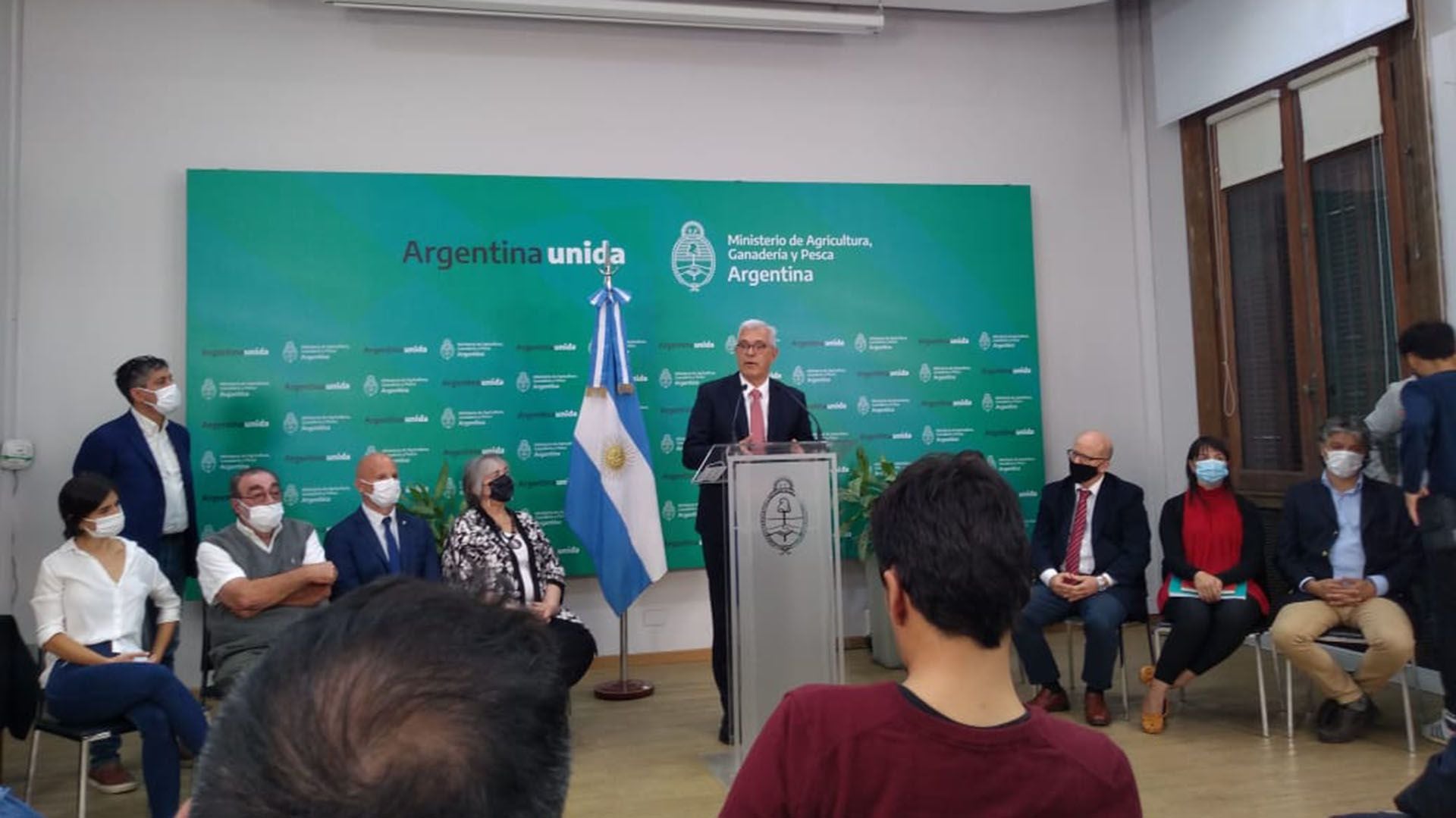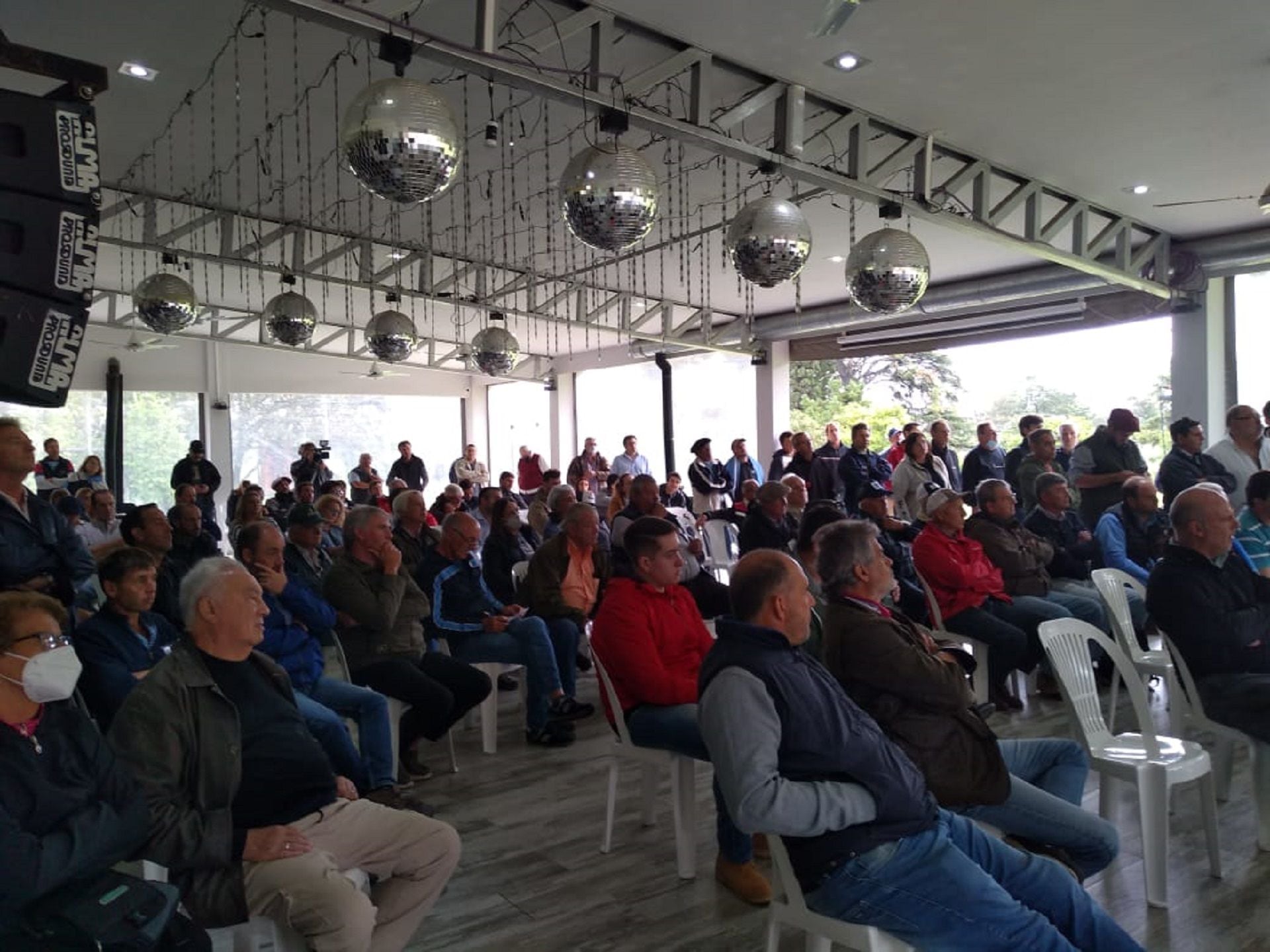
Once again, the Government and the countryside are going through moments of tension in the complex relationship established since the beginning of Alberto Fernández's presidency. The permanent change in the rules of the game and the increase in tax pressure provoke widespread rejection in the productive sector, which during the week was reflected in the discomfort expressed by producers in different assemblies held in the interior of the country.
In the midst of Russia's invasion of Ukraine, which led to a rise in external wheat prices, with an impact on the local market, the government has been concerned in recent weeks about the rise in the price of flour and its effect on the value of bread. And with the alleged objective of defending consumers and producers, it created a wheat stabilization fund to subsidize the price of the 25-kilo bag of flour that reaches bakeries, to be financed with increased retention of soy by-products.
On Saturday, the Minister of Agriculture, Julián Domínguez, stressed that the Government's measures “are temporary” and seek to give predictability to the production sector, ahead of the new wheat campaign, which will begin between the end of April and the beginning of May. He also said that it seeks to benefit consumers of bread and wheat by-products.
But from the private sector they argue quite the opposite.
On the one hand, the Buenos Aires Grain Exchange said that “cutting exports and raising taxes is to slow down the dynamics of the main sector that currently provides foreign exchange and generates employment.” In turn, the Association of Small and Medium Milling Industries of the Argentine Republic (APYMIMRA) said that the Wheat Price Stabilizing Fund “will generate a financial mismatch that puts SMEs at high risk.”

In addition, grain market analysts warned that the increased tax pressure on the oil industry will lead to a lower price for the soy producer. This week in Rosario the value of oilseed fell USD 40 per ton. Finally, different private studies have already pointed out that the incidence of wheat prices on the price of bread is very low: the Agricultural Foundation for the Development of Argentina (FADA) specified that cereal represents 12.9% of the final value of bread, the mill 5.2%, the bakery 60.4% and taxes 21.5%. 67% of the price, he broke down, are costs, 21.5% taxes and 11.5% profits.
All of which raises doubts whether official measures will serve in the “war against inflation” announced by President Alberto Fernández, and creates a context of high uncertainty in the field and agribusiness, especially given the role played so far by Minister Julián Domínguez. At the beginning of March, in response to a media consultation on whether the Government was considering measures to curb the increase in the international price of wheat, Domínguez had replied: “No drastic measures will be taken, such as increased withholding and closing exports.” Days later, the opposite happened.
That is why there are doubts about who makes decisions in agricultural matters. From the Domínguez environment, they say that the minister was in charge of designing the package of measures on wheat. But it was striking that yesterday, in a press conference on the increase in biodiesel retentions, Dominguez first denied it, forcing his Undersecretary for Agricultural Markets, Javier Preciado Patiño, to correct it in front of the cameras: “Sorry, minister, but biodiesel rose to 30%”, he corrected it.
The future of the claim
Following the announcements of the Government, there are three open fronts on how the demand of the countryside and agribusiness will continue.
First of all, mention should be made of the companies that make up the Chamber of Oil Industry (CIARA). Yesterday, in a statement, they stated that the increase in withholding of soy by-products is “illegal”, and that the possibility of bringing this claim to justice is being analyzed. As stated by the Argentine Rural Society and the Rural Society of Jesús María in the amparo they submitted to the federal courts of Córdoba, on December 31, the power of the Executive Branch to modify the withholding scheme expired, the extension of which included this year's Budget, which was not approved in deputies.

In second place is the leadership of the Liaison Table. The presidents of the four entities will seek to raise the issue of withholding in Congress. For this reason, they have already requested an audience with the different political forces that have legislative representation, and the meeting will be held in the coming days. This visit by the leaders to the headquarters of the Legislative Branch would be accompanied by a march of producers who would come from the inside to express that the current withholdings must be 0%.
In the last few hours, the president of the Argentine Rural Society (SRA), Nicolás Pino, said that “the war that the President of the Nation claims to have launched against inflation, is more like a battle against production. Measures are announced that do not solve any of the existing problems, but continue to send terrible signals to the sector. Inflation in food is fought with more supply and these measures do not go along that line.” In this regard, Carlos Iannizzotto, head of Coninagro, also said: “Retentions were not, are not and will never be the way. We don't need 'war on inflation', we call for agreements.”
But the Liaison Table will also propose to discuss an agenda of issues that includes other issues in addition to withholdings: a comprehensive tax reform, multi-risk insurance law, the updating of the Agricultural Emergency Fund, and that there are no restrictions on production, through the Wetlands Act that from different sectors will be is driving, among others.

And thirdly, the claim of producer bases. Since the closure of oil and soybean meal exports, announced last Sunday afternoon, producer assemblies have been held at the crossroads of AO12 and Route 34, near Rosario, in the Cordoba districts of Altos Fierros and Sinsacate, and last Friday in the Buenos Aires city of San Pedro. The concentrations of producers will continue today at 15:30pm, at the roundabout entering the town of Crespo, in the province of Entre Ríos.
The unrest of producers is very great and they propose that national leaders immediately initiate trade union actions, in rejection of the change of the rules of the game, intervention in the markets and high tax pressure. The bases call for a march to the Federal Capital, an agricultural strike and blockade of revenues and expenditures to export ports. The final word on this will be given to the Liaison Table, which for the time being remains cautious when defining the steps to be followed in trade union matters.
KEEP READING:
Últimas Noticias
Debanhi Escobar: they secured the motel where she was found lifeless in a cistern
Members of the Specialized Prosecutor's Office in Nuevo León secured the Nueva Castilla Motel as part of the investigations into the case

The oldest person in the world died at the age of 119
Kane Tanaka lived in Japan. She was born six months earlier than George Orwell, the same year that the Wright brothers first flew, and Marie Curie became the first woman to win a Nobel Prize

Macabre find in CDMX: they left a body bagged and tied in a taxi
The body was left in the back seats of the car. It was covered with black bags and tied with industrial tape
The eagles of America will face Manchester City in a duel of legends. Here are the details
The top Mexican football champion will play a match with Pep Guardiola's squad in the Lone Star Cup

Why is it good to bring dogs out to know the world when they are puppies
A so-called protection against the spread of diseases threatens the integral development of dogs



